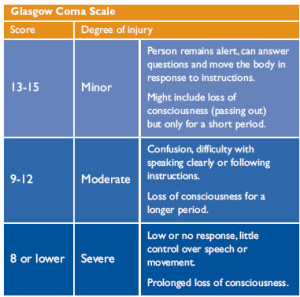SEVERE TBI
As discussed in the article “What is TBI” we explained that there are two types of Severe TBI, described as closed head and Penetrating. These severe head traumas are further categorized as moderate and severe.
Head injuries or head traumas contribute to a large number of deaths and for those that survive a large number of wide ranging permanent disabilities. According to the CDC TBI is the contributing factor for a third (1/3) of all injury related deaths and in 2012 estimated that 2.5 million people sustained some type of TBI.
Sever TBI, like the name implies is a serious affair. For those that survive chances are a life of permanent neurological damage that for some can get considerable better over time. BUT each case is different and there are no guarantees that any certain individual will recover 100%.
The clinical tool designed to asses comatose and impaired consciousness is called the Glasgow Coma Scale and is a severity scoring system. Persons with scores of 3 to 8 are classified as severe. Those with scores of 13 to 15 are classified as mild. There is also the Abbreviated Injury Scale (AIS), the Trauma score and the Abbreviated Trauma score.
• Moderate brain injury is defined as a brain injury resulting in a loss of consciousness from 20 minutes to 6 hours and a Glasgow Coma Scale of 9 to 12
• Severe brain injury is defined as a brain injury resulting in a loss of consciousness of greater than 6 hours and a Glasgow Coma Scale of 3 to 8
*Severe TBI may result in an extended period of unconsciousness (coma) or amnesia after the injury. For individuals hospitalized after a TBI, almost half (43%) have a related disability one year after the injury. A TBI may lead to a wide range of short- or long-term issues affecting:
• Cognitive Function (e.g., attention and memory)
• Motor function (e.g., extremity weakness, impaired coordination and balance)
• Sensation (e.g., hearing, vision, impaired perception and touch)
• Emotion (e.g., depression, anxiety, aggression, impulse control, personality changes)
Moderate to severe traumatic brain injuries can include any of the signs and symptoms of mild injury, as well as the following symptoms that may appear within the first hours to days after a head injury:
Physical symptoms
• Loss of consciousness from several minutes to hours
• Persistent headache or headache that worsens
• Repeated vomiting or nausea
• Convulsions or seizures
• Dilation of one or both pupils of the eyes
• Clear fluids draining from the nose or ears
• Inability to awaken from sleep
• Weakness or numbness in fingers and toes
• Loss of coordination
Cognitive or mental symptoms
• Profound confusion
• Agitation, combativeness or other unusual behavior
• Slurred speech
• Coma and other disorders of consciousness
Approximately 5.3 million Americans are living with a TBI-related disability and the consequences of severe TBI can affect all aspects of an individual’s life. This can include relationships with family and friends, as well as their ability to work or be employed, do household tasks, drive, and/or participate in other activities of daily living.
* image is from American Journal of Neuroradiology
* Information obtained from the CDC

